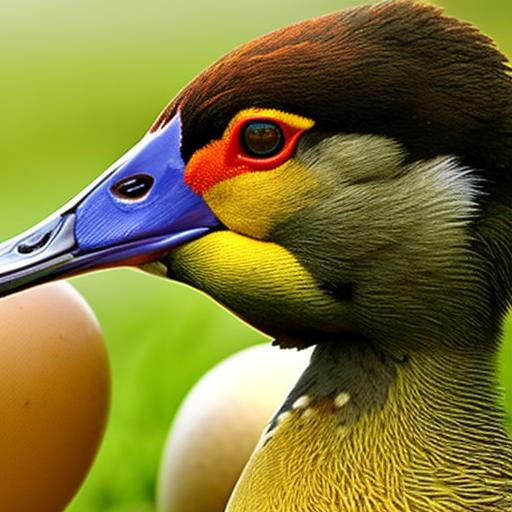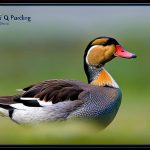Ducks are not only adorable and entertaining animals to have on a farm, but they also make excellent egg layers. There are several duck breeds specifically bred for egg production, each with its own unique characteristics and qualities. These breeds are known for their high egg production rates, nutritional benefits, and sustainable nature. If you’re considering raising ducks for eggs, it’s important to understand the different breeds available and their specific traits.
Ducks are a great option for egg production for several reasons. Firstly, they have a higher egg production rate compared to chickens. While chickens typically lay around 250-300 eggs per year, some duck breeds can lay up to 300-350 eggs per year. This means more eggs for you to enjoy or sell. Additionally, duck eggs have several nutritional benefits that make them a popular choice among health-conscious consumers.
Key Takeaways
- Duck breeds are a great option for egg production, with some breeds laying up to 300 eggs per year.
- Raising ducks for eggs has many benefits, including their ability to forage for food and their resistance to common poultry diseases.
- The best duck breeds for egg laying include the Khaki Campbell, Indian Runner, and Welsh Harlequin.
- When choosing duck breeds for eggs, consider factors such as climate, space requirements, and temperament.
- Understanding the egg laying cycle of ducks is important for maximizing egg production and ensuring the health of your flock.
Benefits of Raising Ducks for Eggs
One of the main benefits of duck eggs is their nutritional value. Duck eggs are larger than chicken eggs and contain more protein and essential vitamins and minerals. They are also lower in cholesterol compared to chicken eggs, making them a healthier option for those watching their cholesterol intake. The higher protein content in duck eggs makes them a great choice for athletes or individuals looking to increase their protein intake.
Another benefit of duck eggs is their unique flavor and texture. Duck eggs have a richer taste compared to chicken eggs, with a slightly gamey flavor that many people find appealing. The texture of duck eggs is also different, with a thicker and creamier consistency that adds depth to dishes like custards and cakes.
Raising ducks for eggs is also a sustainable and eco-friendly option. Ducks are efficient foragers and can find much of their own food by grazing on grass, insects, and other natural sources. This reduces the need for commercial feed and lowers the environmental impact of raising ducks for eggs.
Best Duck Breeds for Egg Laying
When it comes to choosing the best duck breeds for egg laying, there are several options to consider. Here are some of the top breeds known for their high egg production rates:
1. Khaki Campbell: The Khaki Campbell is one of the most popular duck breeds for egg production. They are known for their excellent egg-laying abilities, with some individuals laying up to 300 eggs per year. Khaki Campbells are also relatively small in size, making them a good choice for those with limited space.
2. Indian Runner: Indian Runners are another breed known for their high egg production rates. They can lay up to 200-300 eggs per year and are known for their upright posture and distinctive “runner” stance. Indian Runners come in a variety of colors, adding visual interest to your flock.
3. Welsh Harlequin: Welsh Harlequins are a dual-purpose breed, meaning they are bred for both egg production and meat. They have a good egg-laying capacity, with some individuals laying up to 250 eggs per year. Welsh Harlequins are also known for their calm and friendly temperament.
4. Buff: Buff ducks are a popular choice for backyard flocks due to their docile nature and good egg-laying abilities. They can lay around 200-250 eggs per year and have a beautiful buff-colored plumage.
5. Cayuga: Cayuga ducks are known for their striking black feathers with a greenish sheen. They have good egg-laying abilities, with some individuals laying up to 200-250 eggs per year. Cayugas are also known for their calm and friendly temperament.
Factors to Consider When Choosing Duck Breeds for Eggs
When choosing duck breeds for egg production, there are several factors to consider:
1. Climate and environment: Different duck breeds have different temperature and climate requirements. Some breeds are more cold-hardy, while others thrive in warmer climates. Consider the climate and environment of your area when choosing duck breeds.
2. Space availability: Ducks require adequate space to roam and forage. Some breeds are more active and require more space compared to others. Make sure you have enough space to accommodate the breed you choose.
3. Egg production rate: If your main goal is egg production, consider the egg production rate of different breeds. Some breeds lay more eggs per year compared to others.
4. Temperament and behavior: Ducks have different temperaments and behaviors. Some breeds are more docile and friendly, while others may be more skittish or aggressive. Consider the temperament of the breed you choose, especially if you have children or other animals on your farm.
Understanding the Egg Laying Cycle of Ducks
Understanding the egg laying cycle of ducks is important for managing their egg production. Ducks typically start laying eggs at around 5-6 months of age, although this can vary depending on the breed and individual duck. Once they start laying, ducks will continue to lay eggs for several years, with peak production occurring in the first year.
The frequency of egg laying can vary among duck breeds, but most ducks will lay an egg every 24-26 hours. This means that on average, ducks will lay around 5-7 eggs per week. However, there are several factors that can affect egg production.
Factors that can affect egg production include nutrition, lighting conditions, stress levels, and environmental factors. Ducks require a balanced diet with adequate protein and calcium to support optimal egg production. Providing a high-quality feed specifically formulated for laying ducks is essential.
Lighting conditions also play a role in egg production. Ducks require around 14-16 hours of daylight to stimulate egg production. If natural daylight is not sufficient, supplemental lighting can be provided to ensure consistent egg laying.
Housing and Feeding Requirements for Egg-Laying Ducks

Proper housing and feeding are essential for optimal egg production in ducks. Ducks require a safe and comfortable shelter to protect them from predators and the elements. The housing should be well-ventilated, with enough space for the ducks to move around comfortably.
Feeding requirements for egg-laying ducks include a balanced diet that provides all the necessary nutrients for egg production. Ducks require a feed with a higher protein content compared to maintenance feeds. A feed specifically formulated for laying ducks should contain around 16-18% protein.
In addition to a balanced feed, ducks also require access to fresh water at all times. Ducks have a higher water requirement compared to chickens, as they use water not only for drinking but also for preening and maintaining their feathers. Make sure to provide clean and fresh water in a shallow container that allows the ducks to dip their bills and clean their eyes.
Health and Disease Management in Ducks for Egg Production
Like any livestock, ducks are susceptible to certain health issues and diseases. Common health issues in ducks include respiratory infections, parasites, and nutritional deficiencies. It’s important to implement preventative measures to keep your ducks healthy and minimize the risk of disease.
Preventative measures for disease management include regular vaccinations, proper sanitation practices, and biosecurity measures. Vaccinations can help protect against common duck diseases such as duck viral enteritis and botulism.
Regular cleaning of the duck housing and providing clean bedding is essential for maintaining good hygiene. Ducks should also have access to clean water at all times, as dirty water can harbor bacteria and parasites.
Signs of illness to look out for in ducks include lethargy, loss of appetite, changes in behavior or appearance, respiratory symptoms, and abnormal droppings. If you notice any signs of illness in your ducks, it’s important to consult a veterinarian who specializes in poultry health.
Tips for Maximizing Egg Production in Ducks
To maximize egg production in ducks, there are several tips and strategies you can implement:
1. Provide a stress-free environment: Ducks are sensitive animals and can be easily stressed. Minimize stressors such as loud noises, sudden changes in routine, or overcrowding. A calm and stress-free environment will help promote optimal egg production.
2. Proper nutrition and hydration: Ducks require a balanced diet with adequate protein and calcium for optimal egg production. Make sure to provide a high-quality feed specifically formulated for laying ducks. Additionally, ensure that ducks have access to clean and fresh water at all times.
3. Regular egg collection and cleaning: Ducks may be prone to laying eggs in hidden or undesirable places. Regularly collect eggs to prevent them from becoming dirty or damaged. Clean eggs should be stored in a cool and dry place.
Marketing and Selling Duck Eggs
If you have a surplus of duck eggs, you may consider selling them to generate some income. Finding a market for duck eggs can be done through various channels such as farmers markets, local grocery stores, or direct sales to individuals or restaurants.
Before selling duck eggs, it’s important to familiarize yourself with the legal requirements in your area. Some regions have specific regulations regarding the sale of eggs, including licensing and labeling requirements. Make sure to comply with these regulations to avoid any legal issues.
Packaging and labeling options for duck eggs can vary depending on your target market. Some customers may prefer eggs in traditional cartons, while others may prefer them in reusable containers or even unwashed for a more natural appeal. Consider the preferences of your target market when packaging and labeling your duck eggs.
Is Raising Ducks for Eggs Right for You?
Raising ducks for eggs can be a rewarding and enjoyable experience. Not only do ducks provide a sustainable source of nutritious eggs, but they also add charm and entertainment to your farm. Before getting ducks, it’s important to consider the benefits and factors discussed in this article.
Ask yourself if you have the space, resources, and commitment to properly care for ducks. Consider the climate and environment of your area, as well as the specific needs and requirements of different duck breeds. With proper care and management, raising ducks for eggs can be a fulfilling and profitable venture. So why not give it a try?
If you’re interested in learning more about duck breeds specifically for their egg-laying capabilities, you might find this article on Poultry Wizard quite informative. It discusses the different breeds of ducks that are known for their excellent egg production. From the popular Khaki Campbell to the adorable Indian Runner, each breed has its own unique qualities. To read more about these fascinating duck breeds and how they can contribute to your egg supply, check out the article here: https://poultrywizard.com/keeping-ducks/duck-breeds-for-eggs/.
FAQs
What are duck breeds for eggs?
Duck breeds for eggs are domesticated duck breeds that are specifically raised for their egg-laying abilities. These breeds are known for their high egg production and are popular among farmers and homesteaders.
What are some popular duck breeds for eggs?
Some popular duck breeds for eggs include the Khaki Campbell, Indian Runner, Welsh Harlequin, and the Buff Orpington. These breeds are known for their high egg production and are easy to care for.
How many eggs can a duck lay in a year?
On average, a duck can lay between 150-200 eggs per year. However, some breeds, such as the Khaki Campbell, can lay up to 300 eggs per year.
What is the size of duck eggs?
Duck eggs are typically larger than chicken eggs and have a slightly different shape. They are usually about 50% larger than chicken eggs and have a thicker shell.
Are duck eggs healthier than chicken eggs?
Duck eggs are higher in protein and fat than chicken eggs, and they also contain more vitamins and minerals. However, they are also higher in cholesterol, so they may not be suitable for people with high cholesterol levels.
Can you eat duck eggs?
Yes, duck eggs are edible and are often used in cooking and baking. They have a richer flavor than chicken eggs and are often used in dishes such as custards, cakes, and pastries.
Meet Walter, the feathered-friend fanatic of Florida! Nestled in the sunshine state, Walter struts through life with his feathered companions, clucking his way to happiness. With a coop that’s fancier than a five-star hotel, he’s the Don Juan of the chicken world. When he’s not teaching his hens to do the cha-cha, you’ll find him in a heated debate with his prized rooster, Sir Clucks-a-Lot. Walter’s poultry passion is no yolk; he’s the sunny-side-up guy you never knew you needed in your flock of friends!







